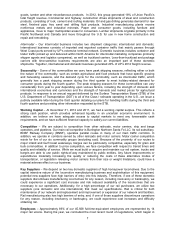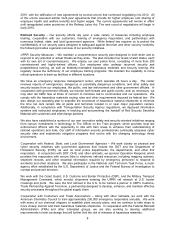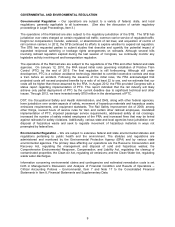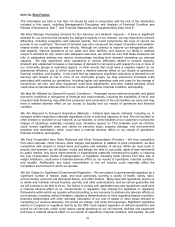Union Pacific 2012 Annual Report Download - page 17
Download and view the complete annual report
Please find page 17 of the 2012 Union Pacific annual report below. You can navigate through the pages in the report by either clicking on the pages listed below, or by using the keyword search tool below to find specific information within the annual report.17
Information concerning environmental claims and contingencies and estimated remediation costs is set
forth in Management’s Discussion and Analysis of Financial Condition and Results of Operations –
Critical Accounting Policies – Environmental, Item 7.
OTHER MATTERS
Antitrust Litigation - As we reported in our Quarterly Report on Form 10-Q for the quarter ended June
30, 2007, 20 small rail shippers (many of whom are represented by the same law firms) filed virtually
identical antitrust lawsuits in various federal district courts against us and four other Class I railroads in
the U.S. (one railroad was eventually dropped from the lawsuit). The original plaintiff filed the first of these
claims in the U.S. District Court in New Jersey on May 14, 2007, and the additional plaintiffs filed claims in
district courts in various states, including Florida, Illinois, Alabama, Pennsylvania, and the District of
Columbia. These suits allege that the named railroads engaged in price-fixing by establishing common
fuel surcharges for certain rail traffic.
We received additional complaints following the initial claim, increasing the total number of complaints to
30. In addition to suits filed by direct purchasers of rail transportation, a few of the suits involved plaintiffs
alleging that they are or were indirect purchasers of rail transportation and seeking to represent a
purported class of indirect purchasers of rail transportation that paid fuel surcharges. These complaints
added allegations under state antitrust and consumer protection laws. On November 6, 2007, the Judicial
Panel on Multidistrict Litigation ordered that all of the rail fuel surcharge cases be transferred to Judge
Paul Friedman of the U.S. District Court in the District of Columbia for coordinated or consolidated pretrial
proceedings. Subsequently, the direct purchaser plaintiffs and the indirect purchaser plaintiffs filed
Consolidated Amended Class Action Complaints against UPRR and three other Class I railroads.
One additional shipper filed a separate antitrust suit during 2008. Subsequently, the shipper voluntarily
dismissed the action without prejudice.
On October 10, 2008, Judge Friedman heard oral arguments with respect to the defendant railroads’
motions to dismiss. In a ruling on November 7, 2008, Judge Friedman denied the motion with respect to
the direct purchasers’ complaint, and pretrial proceedings are underway in that case, the status of which
is described below. On December 31, 2008, Judge Friedman dismissed the complaints of the indirect
purchasers based upon state antitrust, consumer protection, and unjust enrichment laws. He also ruled,
however, that these plaintiffs could proceed with their claim for injunctive relief under the federal antitrust
laws, which is identical to a claim by the direct purchaser plaintiffs. The indirect purchasers appealed
Judge Friedman's ruling to the U.S. Court of Appeals for the District of Columbia. On April 16, 2010, the
U.S. Court of Appeals for the District of Columbia affirmed Judge Friedman’s ruling dismissing the indirect
purchasers’ claims based on various state laws.
With respect to the direct purchasers’ complaint, Judge Friedman conducted a two-day hearing on
October 6 and 7, 2010, on the class certification issue and the railroad defendants’ motion to exclude
evidence of interline communications. On April 7, 2011, Judge Friedman issued an order deferring any
decision on class certification until the Supreme Court issued its decision in the Wal-Mart employment
discrimination case.
On June 21, 2012, Judge Friedman issued his decision certifying a class of plaintiffs to be represented by
the eight named plaintiffs. The class includes all shippers that paid a rate-based fuel surcharge to any
one of the defendant railroads for rate-unregulated rail transportation from July 1, 2003 through
December 1, 2008. This is a procedural ruling, which does not affirm any of the claims asserted by the
plaintiffs and does not affect the ability of the railroad defendants to disprove the allegations made by the
plaintiffs. On July 5, 2012, the defendant railroads filed a petition with the U.S. Court of Appeals for the
District of Columbia requesting that the court review the class certification ruling. On August 28, 2012, a
panel of the Circuit Court of the District of Columbia referred the petition to a merits panel of the court to
address the issues in the petition and to address whether the district court properly granted class
certification.
We deny the allegations that our fuel surcharge programs violate the antitrust laws or any other laws. We
believe that these lawsuits are without merit, and we will vigorously defend our actions. Therefore, we
currently believe that these matters will not have a material adverse effect on any of our results of
operations, financial condition and liquidity.
























